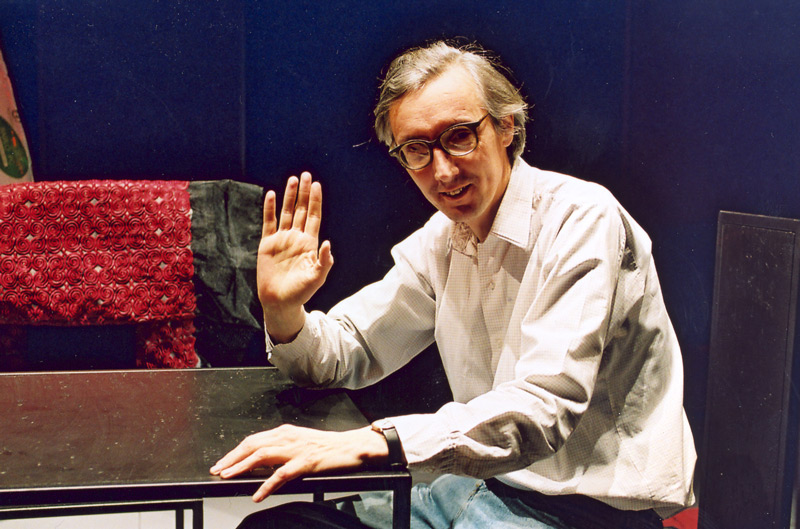about the production
The novel Wahlverwandschaften is the first novel of European literature dealing with a marriage crisis. Goethe wrote it in 1809 just after he turned sixty and three years after he married Christiane Vulpius. Thomas Mann called it “the bravest and deepest novel about adultery ever written in the moral culture of the West”. When writing it, Goethe drawn inspiration from the theory about the selective attraction of elements formulated in 1775 by Swedish chemist Torben Bergman in the paper De Attractionibus Electives. The dynamism of the laws of attracting and repelling, which in the theory determines the attraction of an element, Goethe transferred into the emotional world of people. He decided to examine moral problems by methods of science in marriage, the most sacred institution of the Christian civilization.
The characters of the novel, Eduard and Charlotta, a newly married couple, got married older. Even though they have loved each other from their youth, there were many barriers on the way to their life together. After the wedding they decide to live in their manor house in country. Here they try to cultivate the surrounding land. The peaceful life of the couple is spoilt in the moment when they decide to invite into their house Eduard´s friend Oto and Charlotta´s friend Otilia. It does not take long and Eduard shows his passion for Otilia. It is the same with Oto who tells Charlotta about his feeling towards her. On this double love triangle Goethe meditates on the fatal predestination on one side and the attraction of love which wakes in people an illusion of free selection on the other. The novel, full of dramatic conflicts, heads for a tragic end. The theme Goethe opened in this novel showed to be one of the most important themes and it occurs in works of the most important authors of all generations because it reflects problems and crisis of the whole moral life of the society of the last centuries.
In his work director Jan Antonín Pitínský repeatedly returns to staging poetry and prose. With the ensemble of the Dejvické Theatre he staged the famous production of The Sister Anxiety (based on the poetry of Jan Čep and Jakub Deml, The Divadelná Nitra 1995), he also dramatized prose by Thomas Mann, Franz Kafka, F. M. Dostoyevsky, Graham Green etc.
He chose the first Czech staging of the most important novel of German classicism as a starting point for his rococo stylization with which he works not only when staging operettas but also dramas, i.e. in Schiller´s play Intrigue and Love he does not create the picture of the era, he works with it by many surprising ways. Similarly, to Goethe who writes his novel which, according to Thomas Mann “has the rococo landscape and costumes but its inner humanity does not belong to the 18th century and its stubborn nationalism but leads to new spiritual layers, into darker and deeper emotional and mental worlds.”
Ján Šimko
creators
direction and co-operation on the script: Jan Antonín Pitínský
dramaturgy and dramatization: Karel František Tománek
costumes: Jana Preková
stage design: Jan Štěpánek
music co-operation: Richard Dvořák
movement assistance: Jan Kodet
characters and cast: Charlotta: Lenka Krobotová; Eduard: Jaroslav Plesl; Oto: Václav Neužil; Otýlia: Martha Issová; slúžka / maid: Jana Holcová; count: Pavel Šimčík; baroness: Simona Babčáková; architect: Martin Myšička
director

Jan Antonín Pitínský (1956)
One of the most distinctive personalities of contemporary Czech theatre. The author and co-author of theatre plays, adaptations and scripts, a ballet libretto, prose and poetry. Extremely active theatre director in studio as well as big drama theatres and opera stages. A many-time holder of the Alfréd Radok Foundation Prize (the most important Czech prize for theatre) and the Divadelní noviny Critics´ Awards for the best production of the season. So far he has directed more than 50 productions at many Czech, Moravian and Slovak theatres. With his most successful productions staged in the Czech Republic and Slovakia he visited also the Divadelná Nitra Festival (1995 – The Sister Anxiety; 1996 – Ritter, Denne, Voss; The Chamber; 1997 – Job, The Dinner above the City; 2002 Eleven Songs). Pitínský´s work is acclaimed in Slovakia as well: in 2005 he was awarded the prestigous DOSKY award for the best directon (The Ignoramus and the Madman, Slovak National Theatre Drama Ensemble).
Materials available
Script of the production: CZ
If you are interested in these materials, write to archivy@nitrafest.sk
